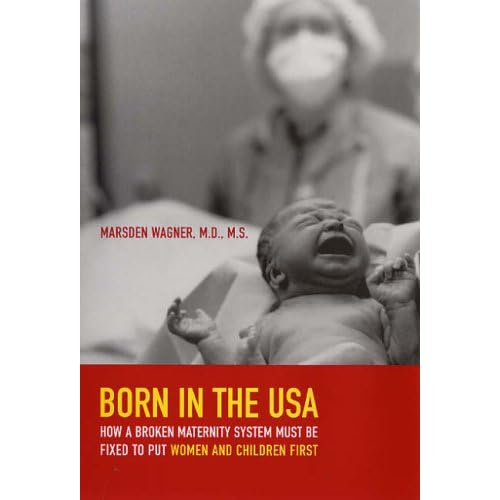 I read this book quite some time ago, and I appreciate Wagner's perspective. Many writers, in writing about birth, come to the table with an outsiders perspective. Marsden Wagner is an insider who is horrified by the way we handle birth, the rights of mothers and the rights of families in this country. He gives an honest look at where we're at, why we're here, and what needs to change. If you have not researched the state of birthing in the US or only looked as far as your OB/Parents Magazine and the popular literature, you will cringe. There is a huge financial stake at risk for OB's and Insurance companies. ACOG is one of the biggest lobbies in DC. Women and their families are the last focus of the current system. Do you really want to rank under money, career stability, prestige and a new car when it comes to giving birth? I sure don't.
I read this book quite some time ago, and I appreciate Wagner's perspective. Many writers, in writing about birth, come to the table with an outsiders perspective. Marsden Wagner is an insider who is horrified by the way we handle birth, the rights of mothers and the rights of families in this country. He gives an honest look at where we're at, why we're here, and what needs to change. If you have not researched the state of birthing in the US or only looked as far as your OB/Parents Magazine and the popular literature, you will cringe. There is a huge financial stake at risk for OB's and Insurance companies. ACOG is one of the biggest lobbies in DC. Women and their families are the last focus of the current system. Do you really want to rank under money, career stability, prestige and a new car when it comes to giving birth? I sure don't.
From Amazon reviews:
*Starred Review* The outspoken former director of Women's and Children's Health at the World Health Organization believes maternity and perinatal care in the U.S. are seriously flawed. To make the point, he cites recent Centers for Disease Control findings that 28 countries have lower maternity-mortality rates; 41, lower infant-mortality rates. This despite the fact that the U.S. spends twice as much or more per capita on health care than any other industrialized nation. Wagner places responsibility squarely on the shoulders of obstetricians and the lobbying power of the American College of Obstetricians and Gynecologists. Interested in one thing above all else--maintaining control of a lucrative market--that group, he avers, foists unnecessary, expensive, and invasive medical interventions upon women when none are needed. Obstetricians are only necessary, he says, in a minority of cases in which serious medical problems threaten the life of mother or child. For the most part, childbirth isn't a medical condition, and infant and maternal mortality rates are lowest in countries in which midwives attend to it. Speaking from his experience as a clinical perinatologist and a perinatal epidemiologist and supplemented by the hoard of credible sources cited in the copious endnotes, Wagner pulls no punches in advocating a woman's right to control the entire reproductive process, from conception through birth. Donna Chavez
Copyright © American Library Association. All rights reserved
Book Description
In this rare, behind-the-scenes look at what goes on in hospitals across the country, a longtime medical insider and international authority on childbirth assesses the flawed American maternity care system, powerfully demonstrating how it fails to deliver safe, effective care for both mothers and babies. Written for mothers and fathers, obstetricians, nurses, midwives, scientists, insurance professionals, and anyone contemplating having a child, this passionate exposé documents how, in the most expensive maternity care system in the world, women have lost control over childbirth and what the disturbing results of this phenomenon have been. Born in the USA examines issues including midwifery and the safety of out-of-hospital birth, how the process of becoming a doctor can adversely affect both practitioners and their patients, and why there has been a rise in the use of risky but doctor-friendly interventions, including the use of Cytotec, a drug that has not been approved by the FDA for pregnant women. Most importantly, this gripping investigation, supported by many troubling personal stories, explores how women can reclaim the childbirth experience for the betterment of themselves and their children.
Born in the USA tells:
* Why women are 70% more likely to die in childbirth in America than in Europe
* What motivates obstetricians to use dangerous and unnecessary drugs and procedures
* How the present malpractice crisis has been aggravated by the fear of accountability
* Why procedures such as cesarean section and birth inductions are so readily used
From the Inside Flap
"Dr. Wagner depicts the state of obstetrical care in the United States with clarity and accuracy. He is clearly an 'insider' who has the courage to tell the truth about how our love affair with birth technology adversely affects both mothers and babies. Importantly, he outlines a path toward much-needed change. Born in the USA should be 'must' reading, not only for all pregnant women, but also for all ob/gyn physicians, hospital personnel, and those who make public policy. Dr. Wagner has done all of us a great service with this book."--Christiane Northrup, M.D., author of Women's Bodies, Women's Wisdom
About the Author
Marsden Wagner, a physician and scientist, is a former Director of Women's and Children's Health at the World Health Organization and a recipient of an Alumnus of the Year Award from the University of California at Los Angeles School of Medicine. He is author of many books, including Pursuing the Birth Machine: The Search for Appropriate Birth Technology and Tough Choices: In Vitro Fertilization and the Reproductive Technologies.

From Amazon reviews:
From Publishers Weekly
According to writer and editor Block (Our Bodies, Ourselves), "the United States has the most intense and widespread medical management of birth" in the world, and yet "ranks near the bottom among industrialized countries in maternal and infant mortality." Block shows how, in transforming childbirth into a business, hospitals have turned "procedures and devices developed for the treatment of abnormality" into routine practice, performed for no reason than "speeding up and ordering an unpredictable...process"; for instance, the U.S. cesarean section rate tripled in the 1970s, and has doubled since then. Block looks into a growing contingent of parents-to-be exploring alternatives to the hospital-and the attendant likelihood of medical intervention-by seeking out birthing centers and options for home-birth. Unfortunately, obstacles to these alternatives remain considerable-laws across the U.S. criminalizing or severely restricting the practice of midwifery have led the trained care providers to practice underground in many states-while tort reform has done next to nothing to lower malpractice insurance rates or improve hospital birthing policies. This provocative, highly readable expose raises questions of great consequence for anyone planning to have a baby in U.S., as well as those interested or involved in women's health care.
Copyright © Reed Business Information, a division of Reed Elsevier Inc. All rights reserved.
Library Journal, 5/15/07
"A stirring discussion of reproductive rights, informed consent, and the rights of the mother vs. the fetus... Recommended."
Kirkus Reviews, (Starred Review) 5/15/07
"A gripping expose... Provocative and hotly controversial analysis of a side of reproductive rights feminism seems to have forgot."
Chicago Reader, 6/29/07
"The book is loaded with interviews, statistics and...some quietly deft storytelling."
BOLD Book Club, October 2007
"[Block] really gets that maternity care is a woman's issue that all people should care about, not just mothers, and she has no agenda through a birth experience or professional work in maternity care. Pushed shines a spotlight on maternity care and asks important questions about the standard practices in America."
Kansas City Star, 10/02/07
"This is a worthwhile book for anyone who cares about reforming our health-care system--right from the start."
Book Description
A provocative and incisive analysis of childbirth in the age of machines, malpractice, and managed care.
In the United States, more than half the women who give birth are given drugs to induce or speed up labor; for nearly a third of mothers, childbirth is major surgery - the cesarean section. For women who want an alternative, choice is often unavailable: Midwives are sometimes inaccessible; in eleven states they are illegal. In one of those states, even birthing centers are outlawed.
When did birth become an emergency instead of an emergence? Since when is normal, physiological birth a crime?
A groundbreaking journalistic narrative, Pushed presents the complete picture of maternity care in America. Crisscrossing the country to report what women really experience during childbirth, Jennifer Block witnessed several births - from a planned cesarean to an underground home birth. Against this backdrop, Block investigates whether routine C-sections, inductions, and epidurals equal medical progress. She examines childbirth as a reproductive rights issue: Do women have the right to an optimal birth experience? If so, is that right being upheld?
Block's research and experience reveal in vivid detail that while emergency obstetric care is essential, there is compelling evidence that we are overusing medical technology at the expense of maternal and infant health: Either women's bodies are failing, or the system is failing women.
About the Author
Jennifer Block is a former editor at Ms. Magazine and an editor of the revised Our Bodies, Ourselves. Her work has appeared in such publications as the Village Voice, The Nation, Mother Jones, and ELLE. She lives in Brooklyn, New York.





2 comments:
Gee..almost a decade on and now I learn that cytotec for labor induction is technically 'off label' usage..awesome. :P
It's been quite a switch in thinking I've had to have, coming to the UK where midwives are common. I don't think GPs (family doctors) would have anything to do with a normal pregnancy/delivery. The fact that so many health professionals actually come to a person's home is quite strange as well. Really though, imagine being hugely pregnant and not having to haul oneself into the doctor's office to have a checkup. It's good that women are waking up to the idea that maybe they shouldn't put up with being processed like cattle the moment their pregnancy test comes up positive..
Having a health professional come to me sounds like a marvelous idea. That would have been nice even though I was pg with my first. I can't imagine hauling 3 boys around and finding something to do with them for umpteen prenatals!
"...maybe they shouldn't put up with being processed like cattle the moment their pregnancy test comes up positive.."
Perfect. I love that line!
Post a Comment